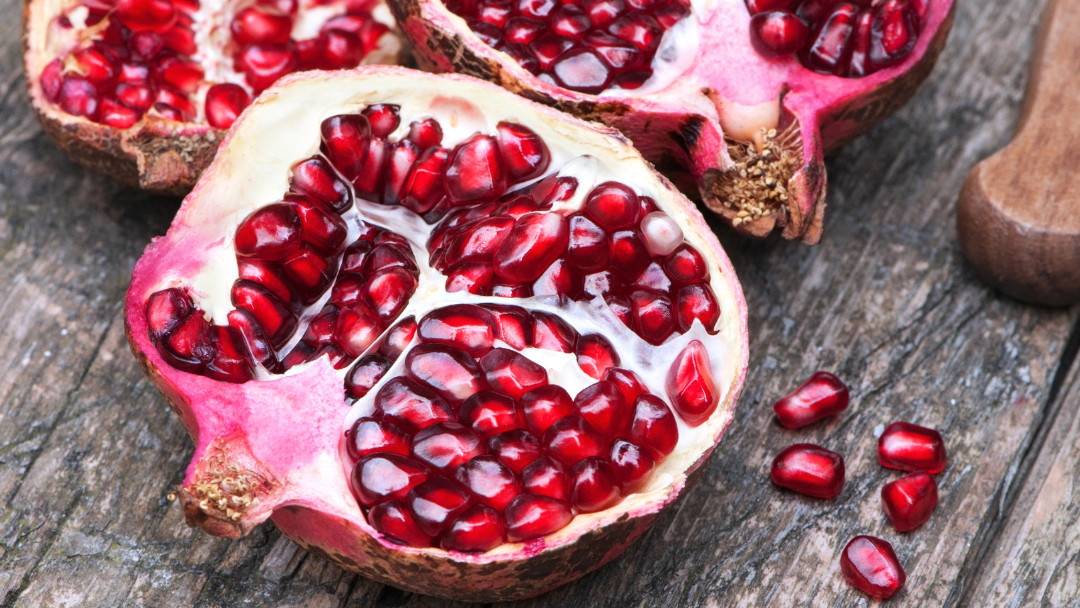Photo: webwaffe/Shutterstock.com
The pomegranate is believed to be one of the oldest cultivated fruits and is a symbol of life, luck, fertility, and abundance in different religions and cultures. According to Greek mythology, Persephone ate pomegranate seeds and subsequently had to spend a third of the year in the underworld with Hades as the pomegranate also represents the indissolubility of marriage. If you consume pomegranate, you will not face the same fate; instead, you might just find yourself avoiding an early trip to the afterlife thanks to the numerous health benefits provided by this delicious fruit. Pomegranates are rich in phytochemicals like ellagitannins, quercetin, kaempferol, luteolin, and anthocyanidins.
Health Benefits of Pomegranate
Blood Pressure. Pomegranate may benefit cardiovascular health because of its ability to reduce oxidative stress, and several studies show that it can reduce blood pressure. A 2023 meta-analysis showed that pomegranate juice reduced blood pressure in a dose-dependent manner, though it did not find a benefit after two months. Another study involving individuals with type 2 diabetes concluded that pomegranate juice could lower blood pressure in a six-week intervention. In this study, those in the treatment group consumed 200 mL of pomegranate juice per day. Additionally, ellagitannins in pomegranate – and their metabolites, urolithins – have antioxidant properties and may protect against the formation of plaques in arteries.
Enhance Exercise Performance and Recovery. Pomegranate may benefit endurance exercise. A 2019 study involving trained male cyclists found that pomegranate extract supplementation for 14 days improved time to exhaustion during endurance exercise. However, though pomegranate contains nitrate – a popular ergogenic aid – it may not confer benefits to resistance exercise performance. It may compromise some aspects of performance due to its high antioxidant content according to a 2023 study.
Furthermore, exercise can cause oxidative stress. While not necessarily harmful to the body in the presence of adequate antioxidants, such as those supplied by pomegranate, health issues may arise when oxidative stress outweighs the body’s resources. However, chronic use of antioxidant supplements, like pomegranate supplements, may impair adaptation to exercise. For those who are in good health and seeking adaptations to resistance exercise, it may be best to avoid supplemental forms of pomegranate and instead opt for whole pomegranate fruit.
Metabolic Health. Various studies support the positive effects of pomegranate phytochemicals on metabolic syndrome. Besides its effect on blood pressure, pomegranate may reduce insulin resistance, vascular injuries, and cytokine levels. A 2022 systemic review of 20 clinical studies reported that pomegranate may reduce body weight, blood pressure, blood glucose, total and LDL cholesterol, and triglycerides. Further, a 2023 study involving individuals with non-alcoholic fatty liver disease (NAFLD) found that, when compared with a placebo, supplementing with pomegranate peel extract (1500 mg) combined with a 500-calorie deficit for eight weeks improved liver steatosis and risk factors of metabolic syndrome, including weight and fat mass, fasting blood glucose, lipid profile, and blood pressure.
Polycystic ovarian syndrome (PCOS) is both a metabolic and endocrine disorder. A 2020 trial found that eight weeks of daily consumption of synbiotic pomegranate juice – or pomegranate juice containing pre- and probiotics – improved oxidative stress, blood pressure, and metabolic health, as measured by triglycerides, total cholesterol, and HDL and LDL cholesterol. Another trial found that pomegranate juice consumption for eight weeks reduced blood pressure and triglyceride levels in individuals with PCOS. Notably, it was also reported that LDL cholesterol levels increased. A more recent study reported that eight weeks of supplementation with concentrated pomegranate juice reduced testosterone levels in overweight and obese women with PCOS, which could relieve some symptoms of PCOS and improve fertility.
Neurological Health. Polyphenol-rich pomegranate is believed to have protective effects against neuroinflammation and could be useful in addressing neurodegenerative conditions like Alzheimer’s and Parkinson’s disease. Additionally, a recent animal study implied that pomegranate may chelate aluminum, an inflammatory and neurotoxic metal, and decrease oxidative stress associated with exposure.
A 2024 study involving 80 individuals with mild cognitive impairment investigated the effects of pomegranate seed oil and the Mediterranean diet on cognition. In this one-year study, both groups followed a Mediterranean diet, and one group also consumed pomegranate seed oil. Results from a neuropsychological assessment showed that the group taking pomegranate seed oil had improved global cognition, processing and executive functions, and verbal episodic memory. Pomegranate seed oil is rich in fatty acids, with the main active compound being punicic acid. Punicic acid has strong anti-inflammatory and antioxidant effects, and it can reduce tau hyperphosphorylation and the formation of beta-amyloid deposits. Though seeds and pits are not usually consumed in other kinds of fruit, pomegranate seeds are found inside the red arils and are normally eaten.
How to Enjoy Pomegranate
Pomegranates are in season in the fall and early winter. They are popular in autumnal recipes, and the sweet arils can be enjoyed on their own or added to salads, oatmeal, grain bowls, and many more dishes. Additionally, pomegranate pair well with nutritious spices like allspice and cinnamon.
Ripe pomegranates are heavy and may be flattened on the sides. To reduce messes when preparing pomegranate, score the fruit along the natural ridges and place it in a bowl of water before opening the fruit to separate the arils. However, this method does result in the loss of some juice. When choosing pomegranate juice at the store, look for products that are 100% juice with no added sugar. The juice can be used in smoothies and “mocktails,” or it can be frozen in ice cube trays for later use in smoothies and other drinks like iced herbal tea.
Final Remarks
Pomegranate can be a nutritious addition to someone’s diet as it is rich in antioxidant phytochemicals. If you have questions about pomegranates, especially supplements, and whether they are appropriate for you, talk to your doctor, nutritionist, dietician, or another healthcare team member for personal options based on your circumstances.





